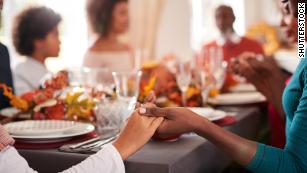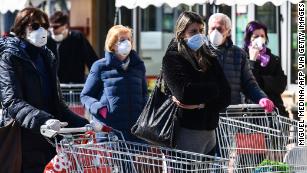Canadian PM Trudeau: 'This sucks'
For weeks, Canadian political leaders in virus hotspots have barred dine-in eating, closed gyms and theaters, and restricted large gatherings.
But family gatherings and house parties are still fueling new Covid-19 cases, straining hospitals and increasing deaths, according to the country's medical experts.
York Region Public Health, a health unit north of Toronto, said a Thanksgiving party with an extended family led to 10 Covid-19 infections, including three babies.
The virus also spread to another household, infecting four more people, and to a workplace where two more people were infected with the virus.
Dr. Eileen de Villa, Toronto's medical officer, warned that infection rates in the city are going in the wrong direction -- and that the timing points to Thanksgiving gatherings as the problem.
"It is clearly challenging to wear a mask while you're trying to enjoy a Thanksgiving dinner or a meal with friends and family," she said last Monday. "These are the kinds of circumstances that give rise to virus transmission, to virus spread and that actually perpetuate the infection throughout our city."
Dr. Karim Kurji, York Region's medical officer of health, warned that while family gatherings may seem harmless, they are a good example of how the coronavirus can spread.
Canada is now experiencing a stubborn second wave of Covid-19, despite widespread mask-wearing mandates.
"We are in an unprecedented global pandemic that really sucks. It's tough going through this second wave, it's frustrating," Canadian Prime Minister Justin Trudeau said during a press conference last Tuesday. "This sucks. It really, really does."
He suggested Christmas gatherings might be off the table given rising infections.
Hospitals in Canada worried about coming holidays
With a surge in cases ongoing and more holidays to come on the calendar, many hospitals in Canada are now activating surge capacity plans, adding temporary Covid-19 units and more acute care beds.
As Christmas nears, critical care specialists are again worried about the consequences as government statistics show hospitalizations nearly doubled in the last month alone.
"Clearly, even though we haven't, in Canada, experienced one of the catastrophic scenarios we fretted over in April, we shouldn't feel too safe," Dr. Francois Lamontagne, a clinician and scientist at the University of Sherbrooke in Quebec, told CNN.
"There are still many reasons to worry, and Europe is offering many arguments to ward off 'public health fatigue' in the general population."
Lamontagne's research involves critical-care therapeutics and diagnostics and his experience and research spans the Ebola crisis in Africa, as well as the current treatment of Covid-19 patients.
His advice for dealing with the current surge is two-fold; one clinical and the other involves the disinformation and confusion currently making the rounds and contributing to the spread of the virus.
"It's an essential message, it's stick to what you know and do it well and be very wary of unfounded claims of wonder drugs and I think that's key," he said, adding that, "steroids or corticosteroids are now proven as effective and they are, and should be, administered to severe cases and that has contributed to improved outcomes."
But Lamontagne said he's also concerned about how some people now distrust authorities and the medical advice they dispense about the virus.
Distrust, he said, can have dire consequences for public health, especially as some now feel the holidays are a good excuse to give in to pandemic fatigue.
"We should not underestimate the impact of communication, honest communication. And sometimes the honest answer is we don't know," Lamontagne said, pointing out that the uncertainty about the virus is reason enough for people to comply with public health restrictions.
Canada's public health experts are hoping the rising hospitalizations will convince Canadians to heed the advice, especially in their own homes.
"I think we need to consider all the celebrations that are coming up whether it's Diwali, or Hanukkah, or Christmas and look at how we can regroup and focus on our immediate families and making sure we can support each other to do it safely," said Henry, who added that large family gatherings will likely not be a part of Christmas this year.
How the US is handling the holidays
The United States has recorded
more than 9.1 million infections and 230,548 deaths during the pandemic, according to data from Johns Hopkins University (JHU).
October was a month of grim records in the Covid-19 pandemic in the US, and as November begins, experts say the United States hasn't seen the worst of it.
Hospitals could become overwhelmed as the number of coronavirus cases continues to climb, Dr. Christopher Murray, director of the University of Washington's Institute for Health Metrics and Evaluation (IHME), told CNN's Anderson Cooper on Friday.
"The fall/winter surge should lead to a daily death toll that is approximately three times higher than now by mid-January," the IHME said in its latest forecast.
Fauci said that given the current spread of Covid-19 and the uptick in infections, people need to be very careful about social gatherings.
The US Centers for Disease Control and Prevention
also recently released guidance on holiday gatherings and what Americans need to be aware of before traveling, hosting or attending parties -- or just gathering with family and friends over the Thanksgiving holiday.
The lowest risk for contracting the highly infectious virus or spreading it is simply celebrating Thanksgiving in your own home with members of your household and/or virtually with extended family, the CDC said.
If you are going to host a Thanksgiving dinner, the CDC recommends organizing an outdoor event with family and friends from your neighborhood. Large, indoor gatherings, dinners or parties, especially with people from outside your immediate family, pose the highest risk.
Traveling during the holidays, on planes or public transportation, increases the chances of catching and spreading Covid-19 because it increases exposure to the virus, the CDC said in its holiday guidelines.
The agency said, "staying home is the best way to protect yourself and others."
CNN's Shelby Lin Erdman, Madeline Holcombe and Lauren Mascarenhas contributed to this report.









No comments:
Post a Comment